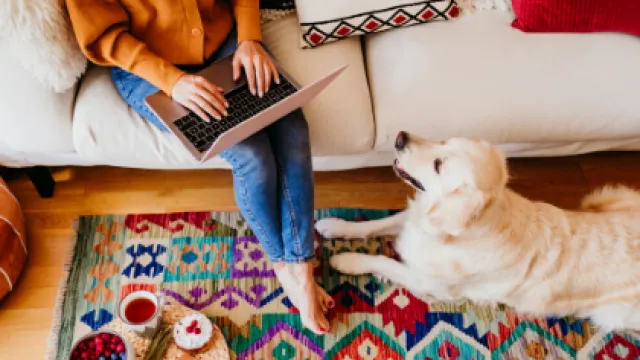Working From Home With Your Dog?

Do you now find yourself working from home? Some dogs ease into this scenario and are able to be with their owners throughout the day without exhibiting behavioural issues. For others, however, there are a number of problems that may arise - such as dogs demanding attention by barking or whining, often at the worst possible times.
Why do dogs act up in the home office environment?
Because of the large amount of time spent together in close proximity, dogs often have increased opportunities to train their owners! They might nudge at you for attention, asking to be petted, or climb into your lap. They may bring you a toy and drop it at your feet. Dogs will often rest or nap under the table or desk where their owners are working, but when they wake up, they request attention - and usually get it!
While seemingly cute and innocent, whenever a dog gets to direct the behaviour of their owner, they see themself as being put in the leadership role. As the leader, a dog may feel they need to demand their owner's attention all the time - and often at inopportune times, such as during an important conference call or executing on an important work product.
What can dog owners do to help adjust to this new working enviornment?
Separate your workspace from the dog's space. Go to work in another room, separated from your dog. It's important that your work area is off-limits and that your dog has their own safe space throughout the day. It is important that your dog doesn't have constant access to you. If they bark for your attention, at first, you may want to have at least a couple of closed doors between you as they get used to the new situation. You may want to give your pup something to occupy their attention such as Bark Busters GameChanger® toy, or other appropriate toy or blanket.
Do NOT go to your dog's space if you hear barking, whining, pacing. Go to your dog's space only when your dog is calm and quiet. If you go to your dog when they act out of stress, they will learn that making a fuss is rewarded with your attention.
Practice your training exercises! Training your dog will engage their brain. This "brain-drain" will tire them out and help them become more calm. With some dogs, brain exercise is as important, if not more important, than physical exercise.
Be proactive in asking for your dog's attention and focus. Always begin play on your terms! For example, if your dog brings you a toy to play, take control of the toy and wait until later to bring it out yourself and initiate play.
Set or establish time for you and your dog. If you went off to work without your dog, you would only have certain times in the day when you could interact with them. Set up a similar scenario with your pup now even though you are home! For example, take a 10-15 minute break mid-morning and again in the afternoon, or a half-hour at lunchtime. Do what works for you, and also meet your dog's physical and mental needs. It's important that you don't continously stop what you are doing and engage with your dog. They'll quickly get used to the cues you give for your set interactions and will settle down quicker during the in-between times.
Most of all, be patient, calm, and consistent. Your dog's bad behaviours are simply learned behaviours, because they have worked in the past. Your dog will learn to make different choices if those strategies no longer result in your attention and what they interpret as praise. If you never separate from your dog over the coming weeks, they will have a hard time feeling comfortable by themself when you do have to leave. Practicing separation while working from home will help you both be more relaxed and happy, together or apart.
If you are having issues working from home with your dog, Bark Busters Home Dog Training is here for you.
Recent Articles
- How to Show Affection to Your Dog This Valentine’s Day
- Back to School Guide: Helping Your Dog Adjust to the New Routine
- How To Keep Your Dog Cool in the Summer Heat
- Keep Your Dog Safe This Summer: Bark Busters’ Essential Tips
- Christmas Dog Safety Tips: Keep Your Dog Safe & Happy This Festive Season
- Dog Aggression Training & Tips
- Leash Training - How to Stop your Dog from Pulling on Walks
- Halloween Safety Tips for Dog Owners
- Why Is My Dog Barking So Much? Understanding Excessive Barking and How To Help
- Understanding and Training Dogs with Separation Anxiety
